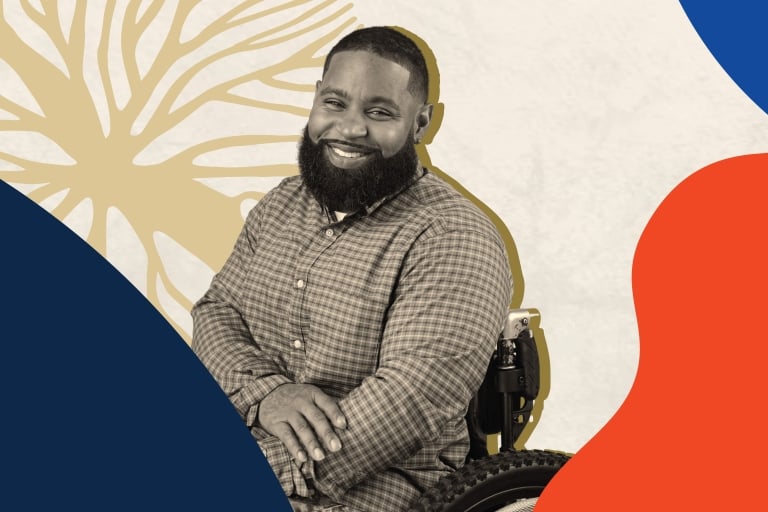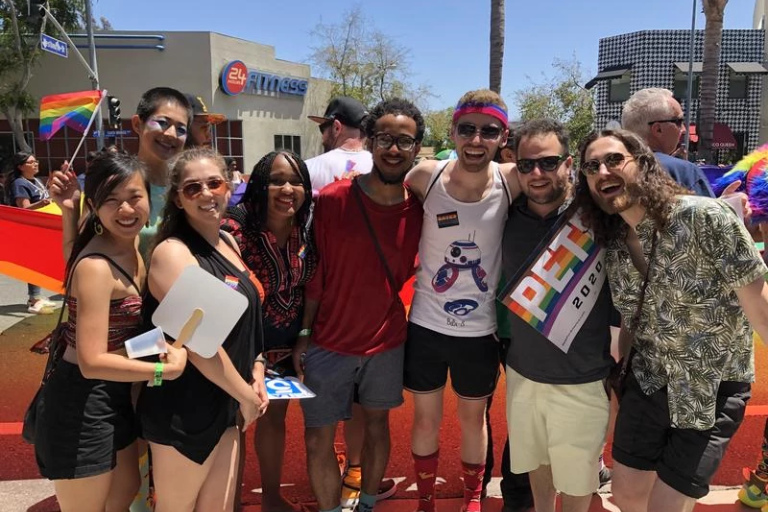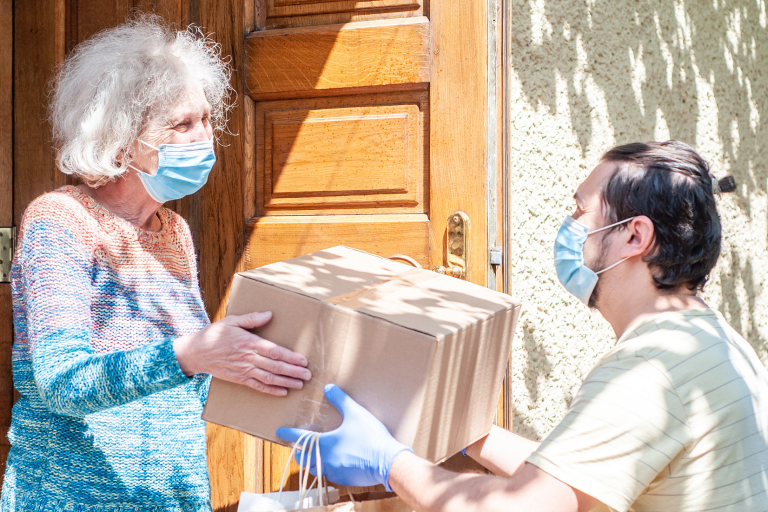By
Published
August 20, 2018
Tags
I live in Los Angeles, the film capital of the world. Over the years, some of the most powerful moments have been captured on screen for the world to see. These scenes have impacted who I am, my outlook on life, my career, my story and my reality. On my recent REALITY Storytellers journey to Israel, I discovered my own reality in what, at times, felt like scenes from a movie.
Most of the time, before a script becomes a movie, it starts as a story. Movies and stories share a common connection. When I watched movies and read fairy tales as a child, I dreamed of my future. I was the kid who watched every movie possible and performed them live in the family living room.
My mother introduced me to Funny Girl, When Harry Met Sally and West Side Story. My father made sure Spaceballs and The Godfather were added to the rotation. I wrote an essay in 7th grade about how Forrest Gump was “the best movie ever.” My sister and I would sing along and dance to “I’ve Had The Time of My Life” in Dirty Dancing, praying we too would have a handsome dance partner come into our lives and sweep us off our feet.
Movies and stories not only shaped my dreams, but also how I have lived my life. At awkward funny moments, I’d ask myself how would Mel Brooks make a joke about this? When adulting felt way too hard, I’d think about Holden Caulfield doing everything he could to postpone growing up. When trying to establish my identity and purpose amongst my family and community, I wondered if I would ever leave a legacy as strong and kind as Forrest Gump or as loyal and powerful as Vito Corleone.
And when romance woes brought me down, I’d think about Fanny Brice’s devotion to Nick Arnstein, regardless of her broken heart and how quickly love fades from “hello gorgeous” to “so long, funny girl”. Or Sally, finally realizing Harry was The One, and how Tony and Maria fell effortlessly in love at first sight. Would I ever have an epic moment where my soul mate tells me he “wants to start our lives as soon as possible?” or would I sing it out from New York rooftops with my star crossed lover?
Truth be told, I’ve always looked for those a-ha Hollywood scenes – this is the person, the job, the life altering moment, the cause or reason. In the last few years, I’ve realized that while the stories that other people have written have helped me figure out what I love, fear and desire – I wasn’t giving enough attention to my story. The scenes that I choose to write every day. Not only the wins, but the losses, mistakes, grief and joys.
As I pondered this predicament, I remembered Brené Brown’s words of wisdom: “Our job is not to deny the story, but to defy the ending — to rise strong, recognize our story, and rumble with the truth until we get to a place where we think, Yes. This is what happened. And I will choose how the story ends.” Movies have a beginning and an end; we know what happens between the credits whereas your life is full of journeys and is still unfolding, and the only constant is rolling with the punches and a whole lot of uncertainty.
My recent trip to Israel was such a whirlwind journey of emotions and experiences that it felt as if I was deep in character inside my own personal movie. The beautiful backgrounds of crater, the energetic magic of Tel Aviv, borders, desert, country and sea were idyllic surroundings. By the closing credits, my experience shaped my reality, filled with sudden breakthroughs, real dilemmas and engaging dialogue.
On day one, jet lagged, yet excited to meet my new community, our story began as we circled together under a tent in Neot Kedumin, Israel’s biblical landscape reserve, where the physical setting of the bible has been recreated on the land. We met with our cohorts -- out of 50 travelers, the dozen people in our cohort would become our “homeroom” for the journey. We shared our intentions for the week with each other. I shared that I wanted to listen -- to show up wholeheartedly, absorb as much insight as possible and become a stronger storyteller through these interactions. We started to share our stories, and the action of everyone’s vulnerability filled every inch of my soul. There were several moments when I learned key lessons for my story by paying attention and absorbing all the curiosity and insight that surrounded me.
Scene 1: As we approached the Syrian border through the Golan Heights in ATVs, naturally, everyone enjoyed themselves with the thrill of driving over rough terrain and exploring the area as race car drivers in the desert. Suddenly, like a mirage, we approached an abandoned bunker. Covered in graffiti, bullet holes and slogans, it later ended up on many of our Instagram stories, and became a moment to capture as it felt as if we had traveled back in time. We went to the roof where only a few hundred feet away the southern border of Syria stood in utter turmoil; hardly any of us were able to truly comprehend the conflict. There, I realized how historical this exact spot was, that this region has been for years a center of major conflict for the Jewish people and their innocent neighbors. I became aware that among these images and slogans in this very spot, lives were lost defending their right to exist after decades and centuries of persecution. As I felt this wave of emotion, I turned down the hall of the bunker and saw a red swastika spray painted on the wall.
This hit me like a ton of bricks; because when I see this symbol all I think about is the most unexplainable cruelty done unto the Jewish people and other communities by the Nazis during the Holocaust. It dawned on me ardently that those who nearly lost their race and religion went from surviving WWII to finding themselves rebuilding and redefining their identities in a completely new land. Where were they meant to go after losing their home, loved ones and all they knew? This strength, resilience and determination that they managed to manifest is something I will never know first hand, only from stories told. The spirit and energy in this bunker was full of historical emotion.
In the moments before, this had been a scene of fun, games and photo opps. I began to feel the seriousness, the presence of those suffering right now in Syria, and those before me who had fought for this land and their people. Last to leave the bunker, I walked back to my ATV and saw my friend who enthusiastically took the driver seat. He asked, “What’s wrong? It looks like you saw a ghost?” I felt like I had. We launched into one of the most transformative conversations that I had on the trip. I told him my experience and the thoughts that entered my mind. He responded with “I get it now. For Israel, it’s not just about the land, it’s about the people and their right to exist.”
Here, a Black American man and a Jewish American woman were able to relate based on ancestors and history. We went on to discuss that even though our ancestors went through different types of adversary and oppression, we both could understand what we personally didn’t understand, yet we still felt we could relate. I felt closer to another’s past and their story more than I ever had before.
Scene 2: Together we went to Yad Vashem, the Holocaust museum in Jerusalem located on the top of Mt. Herzel, where the scenic view of the land brings about tears and hope. We went to hear Survivor Giselle Cycowicz, 91, share with us her story. We cried and thanked her for her courage and strength, especially in reliving her past with us. She told us that she wasn’t strong, she merely survived and that she was just lucky to have made it. This woman has been sharing her story for decades. When I went to give her a hug with utter gratitude and confided in her how my family too had lost our loved ones in the Holocaust, her eyes lit up and asked, “You are Jewish?!?” with the most gleeful smile, a question that if she was asked more than 75 years earlier would have not been possible. This story, of what happened to her, what came after and the hope she has 75 years later in forgiveness, the hope for Israel and the Jewish people was a life changing moment for me.
From listening to Giselle, my responsibility became crystal clear. To never forget where and who I came from, the power of my story and how I must continue to live on my family’s legacy, share and connect with others so we can all learn from our life’s experiences. It reminds me of a powerful quote that Elie Wiesel wrote in Night, “Our lives no longer belong to us alone; they belong to all those who need us desperately.”
Scene 3: On our last night in the star lit sky of the Ramon Crater, we literally listened to our deepest thoughts and feelings. We walked silently into the darkness of the crater, led only by the sound of own voices and the star lit sky. We spoke our most precious inner thoughts out loud to ourselves, practicing the Jewish practice of Hitbodedut, an unstructured, spontaneous and individualized form of prayer and meditation. We were leaving Israel with more questions than we came in with -- about ourselves, our purpose, and how this country’s story will live inside us all.
We were all challenged to look within, to better understand what is going on all around us. The only way to start to understand the hearts and minds of others is to begin with your own story, your truth, and the power you have to shape that story every single day.
The scenes we shared on the REALITY Storytellers journey allowed me to truly listen and to hear new points of view. As these experiences unfolded, I reminded myself of this powerful lesson from Brené Brown: “Choosing to get curious, is choosing to get vulnerable, because it requires us to surrender to uncertainty.” From reflections like this, I also learned how the power of story can impact hope and ignite perspective for others. Israel is one of the planet’s most fascinating anomalies. It is beautifully imperfect, and its history runs infinitely deep. The people of Israel have different stories, and they connect to the land in divergent ways. As visitors, we become a part of its history – and as storytellers, we acquired a new responsibility. The responsibility to absorb as much information in a complicated environment and to break down misconceptions as we were there on the ground. What stories were we hearing and how were they different with those thoughts we came in with? Had they been told the same from the beginning? What was holding this region or any others back from creating a new narrative?
We utilized Israel as a prism to look deeper within ourselves and our personal identities. Surrounded by the intricacies in Israel of the conflicting existence of Arab Israelis, the lack of unity between the orthodox and secular communities, and the challenges of co-existence with the Palestinians enabled 50 storytellers to think alternatively on situations that were perhaps too messy of subjects prior. How could we relate? Could we at all? These questions were a constant in our narrative.
Movies and stories have one point of view, and are finite in execution. It would be so much easier if our journey had a Hollywood beginning, middle and end. But as we see in the movies, just like the ones that I fell in love with as a kid, it doesn't always turn out the way we predict at the very start. Israel is beautiful, complex, flawed, resilient and constantly evolving. The country is a sign of life, a tale of strength and what life really is; it’s not a black and white film, but a full technicolor experience. Our lives are just the same, and as soon as we can own the story we begin to live, we can create our happy, meaningful ending along the way with a myriad of scenes, characters, conflicts and, most of all, the moments we could never predict that change our hearts and minds for the better.
The End… until the next journey.
Originally published on Thrive Global.
The Charles and Lynn Schusterman Family Foundation is proud to empower emerging leaders to explore their values, identity and new ways to strengthen their communities. We believe that as we work together to repair the world, it is important to share our diverse experiences and perspectives along the way. We encourage the expression of personal thoughts and reflections here on the Schusterman blog. Each post reflects solely the opinion of its author and does not necessarily represent the views of the Foundation, its partner organizations or all program participants.





